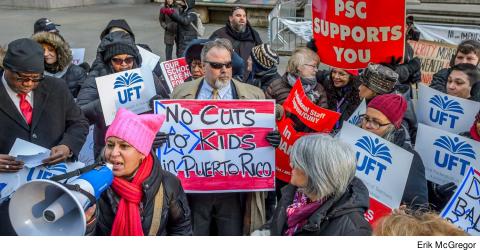The island’s education system is at stake
 |
The PSC joined other labor and community groups on March 13 to protest the unelected Fiscal Control Board for Puerto Rico and to demand that any fiscal restructuring imposed on the island put children and education first.
The control board was set up by the Obama administration after the territory, which owes creditors close to $70 billion, defaulted on some of its debt obligations in 2015. Critics of the board claim that it is designed to destroy the island’s vital public sector, especially its K-12 and higher education systems, for the benefit of hedge funds. As some CUNY community members have noted, the ordeal bears a resemblance to the structural readjustment CUNY and other city institutions faced after the 1975 fiscal crisis. University of Puerto Rico students went on strike for several days in February to protest against looming education cuts.
LINKING STRUGGLES
PSC Executive Council members Blanca Vázquez and Lizette Colón joined President Barbara Bowen at the rally, which was organized with support from the American Federation of Teachers. Colón, the PSC chapter chair at Hostos Community College, linked the struggle in Puerto Rico to the struggle at CUNY.
“As a union including hundreds of Puerto Rican faculty and staff, and working with thousands of Puerto Rican students in New York, we support our brothers and sisters because we know, as they do, what it takes to fight back against cuts and how to take on the powerful and win,” she said at the rally. “Puerto Rico has already seen unfair tuition hikes for students and debilitating cuts of hundreds of millions of dollars from higher education. Now salaries are being threatened. Our fight is their fight, and we will stand united to resist the imposition of austerity on students, teachers and working people in Puerto Rico.”
In an email interview, Héctor Cordero-Guzmán, a professor of public affairs at Baruch College, explained the dire position of the island’s public university system.
“The University of Puerto Rico (UPR) receives over $800 million per year from the government of Puerto Rico for its 11 campuses to cover operations and to subsidize tuition to the over 40 percent of students that come from families below poverty,” he said. “The Federal Financial Control Board has asked the government to cut its contributions to the UPR by $350 million to $450 million dollars per year over the next three years. While the university must continue to take steps to operate transparently and effectively, such a massive public cut over such a short period of time is unprecedented in US higher education and will be destructive. The proposed cuts mean that student resources and services could be reduced, faculty salaries could be frozen or cut, new hiring would be frozen [and] research funds will be limited.”
ASSAULT ON PUBLIC HIGHER ED
Cordero-Guzmán continued, “A massive cut on the UPR is an assault on public higher education and on the people of Puerto Rico and will result in less access to education, reduced opportunity for the next generations, more out-migration from the island, and a compromised and more uncertain future for the people of Puerto Rico.”
With rally participants from the United Federation of Teachers and New York State United Teachers, the rally also focused on impending cuts to the territory’s K-12 education system.
The rally revealed many of the political differences within the Puerto Rican community, however, the issue of opposing austerity was a unifying factor.
Bowen said, “Everyone there opposed the structuring to benefit creditors over impoverished children and working people.”

